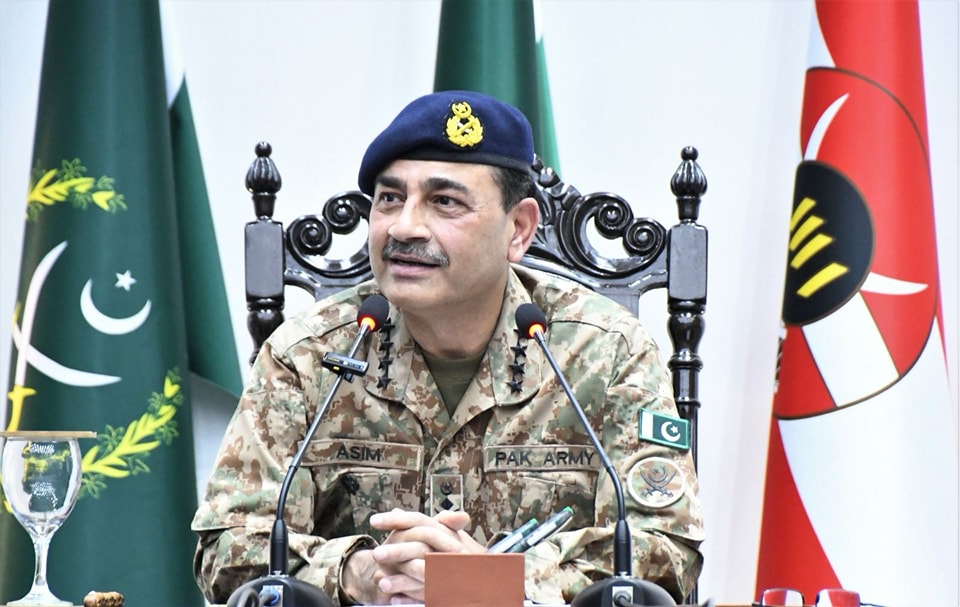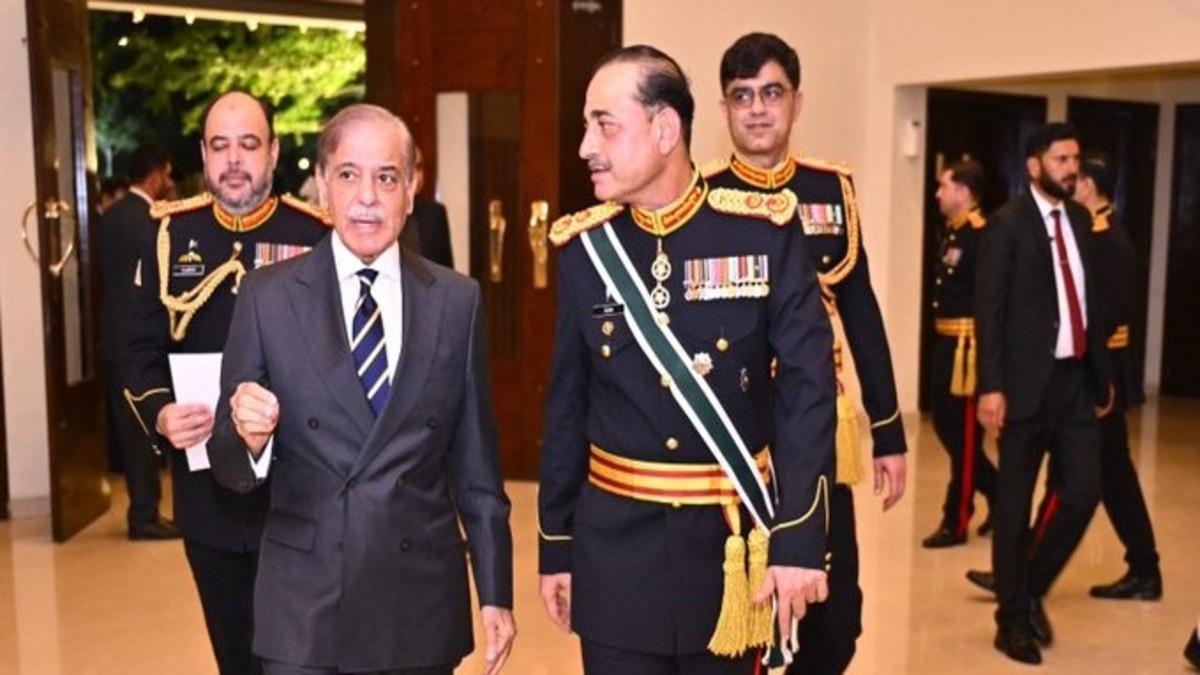In a thunderous and deeply consequential address at the prestigious Pakistan Naval Academy, Asim Munir, the Chief of Army Staff, delivered what is already being called one of the most provocative speeches by a Pakistani military leader in recent memory. His fiery rhetoric sent political tremors across South Asia, rekindling old anxieties about potential armed conflict between the nuclear-armed adversaries, Pakistan and India.

Standing before rows of cadets, naval officers, and dignitaries, the General abandoned the traditional tone of military restraint and instead launched into a defiant and uncompromising narrative. “We will no longer tolerate provocations disguised as policy,” he thundered, calling out India in explicit terms for what he labeled as “unprovoked aggression” and reckless geopolitical adventurism. “Kashmir is not just a dispute—it is the jugular vein of Pakistan,” he declared, invoking a phrase that resonates deeply with the national psyche and history of Pakistan.
The speech marks a significant shift from previous military addresses, reflecting a more assertive posture amid rising tensions. The implications of this rhetoric extend beyond bilateral relations and may influence regional security dynamics, especially given South Asia’s complex web of alliances and rivalries.
Asim Munir Accuses India of “Unprovoked Aggression” in Recent Strikes
According to the Army Chief, India carried out “two unprovoked military strikes” in recent months—actions Pakistan allegedly chose to absorb in the name of regional peace. But those days, he warned, may be over.
“Our restraint should not be mistaken for weakness. Next time, our response will be decisive—and final.”
This stark warning echoes Pakistan’s Operation Swift Retort in 2019, when the country shot down an Indian fighter jet in retaliation for airstrikes in Balakot. That incident marked a rare escalation between the two nuclear-armed neighbors and served as a reminder of the volatility in the region.
The commander, a former spymaster and recently the first Pakistani Field Marshal since Ayub Khan, has steadily tightened his grip over Pakistan’s security establishment. Observers say he is positioning himself not just as a military leader but as a guardian of Pakistan’s ideological and religious foundations.
His rise within the ranks corresponds with a period of increasing militarization in Pakistan’s domestic and foreign policy, particularly with regard to India and Kashmir. Many analysts believe his recent rhetoric aims to reinforce a narrative of strength amid ongoing economic difficulties and political instability at home.
The wider South Asian security context, including China’s growing influence and U.S. strategic interests, also forms a backdrop to this evolving posture. How the military leadership balances these external pressures remains an open question.
Historical Context: Kashmir and the Roots of Indo-Pak Rivalry
To fully appreciate the gravity of the Army Chief’s statements, it is essential to understand the historical context of the Kashmir conflict. Since the partition of British India in 1947, Kashmir has been the most contentious issue between India and Pakistan. Both countries claim the region in full but administer only parts of it, leading to multiple wars and ongoing conflict.
The first Indo-Pak war over Kashmir ended with a UN-brokered ceasefire in 1949, establishing the Line of Control (LoC) that divides the territory. However, neither side has relinquished their claims, and periodic skirmishes and militant activity have perpetuated instability.
Pakistan views Kashmir as a core part of its identity, partly due to its Muslim-majority population, while India maintains that the region is an integral part of its secular democracy. This fundamental disagreement underpins much of the regional hostility.
The region’s geography, including mountainous terrain and strategic access points, adds to its military significance. Control over Kashmir impacts water resources, trade routes, and national security calculations.
India Responds to Asim Munir’s Kashmir Claims: “Kashmir Is Ours—Period”

India’s Ministry of External Affairs (MEA) quickly rebutted the assertion that Kashmir is the “jugular vein of Pakistan.”
“Pakistan should mind its own internal affairs rather than peddling outdated fantasies about Kashmir,” said an MEA spokesperson. “Jammu & Kashmir is and will remain an integral part of India.”
Indian media widely characterized the speech as inflammatory. Several outlets highlighted the timing, which coincides with increased Indian security measures along the Line of Control (LoC). These steps include troop reinforcements and upgraded surveillance capabilities, particularly in sensitive sectors like Samba and Uri.
The renewed rhetoric has also fueled nationalist sentiments within India, where the Kashmir dispute remains a deeply emotive and politically charged issue. Analysts warn that such public exchanges increase the risk of miscalculations on both sides.
Notably, the Kashmir region itself has witnessed an uptick in localized unrest, protests, and military skirmishes, all adding layers of complexity to the dispute. The delicate balance maintained by decades of ceasefire agreements is under stress, with international observers urging dialogue.
In addition, India has been pursuing internal reforms in Jammu & Kashmir since the revocation of Article 370 in 2019, which removed the region’s special autonomous status. This move has been a flashpoint, leading to increased tensions and criticism from Pakistan and some international actors.
Asim Munir Calls Pakistan a “Net Regional Stabiliser” Amid Rising Tensions
While portraying Pakistan as the “net regional stabiliser,” the military chief’s speech brimmed with warlike overtones. He described India’s actions as “arrogant,” “provocative,” and “dangerously shortsighted,” further fueling speculations about a possible military showdown.
His comments ignited a firestorm across Indian media, which have labeled the rhetoric as aggressive and unproductive. The Indian Ministry of External Affairs swiftly rejected the “jugular vein” metaphor, reiterating that Jammu & Kashmir is an integral part of India.
“Pakistan should mind its own internal affairs,” one MEA spokesperson emphasized, “rather than peddling outdated fantasies about Kashmir.”
Beyond media rhetoric, both countries have engaged in sporadic ceasefire violations along the LoC in recent months, underscoring the fragility of peace in the region. Read more about India-Pakistan ceasefire violations.
Furthermore, the renewed hostilities have resulted in humanitarian consequences, with local populations caught in crossfire and facing displacement. International human rights organizations continue to monitor the situation closely.
Asim Munir’s Religious Rhetoric Sparks Regional and Global Concern
What truly alarmed geopolitical analysts, however, was the repeated invocation of religious symbolism in the speech. The Army Chief called on Pakistanis to “support the Kashmiri brothers” and framed the dispute as not just political but spiritual.
Critics argue this kind of Islamist-nationalist rhetoric dangerously blurs the line between state policy and ideological extremism. According to Swarajya, these comments reflect “a dark return to 1990s-style jihadist politics.”
Such rhetoric risks further polarizing an already volatile region, complicating efforts by international mediators to promote dialogue. Experts caution that mixing religious appeals with state military policy could embolden extremist groups and escalate tensions beyond conventional conflict.
The international community, including the United Nations and various human rights bodies, has expressed concern over the potential for sectarian violence fueled by such statements.
This dynamic also impacts Pakistan’s relationships with other Muslim-majority countries. While some Gulf states have historically supported Pakistan on Kashmir, there is growing concern among global Muslim leaders about the rise of militant rhetoric and its consequences for regional stability.
Is Asim Munir Pushing South Asia Toward War?
Indian military experts have downplayed the threat, calling the speech “desperate posturing.” However, insiders confirm that India is taking no chances. Quiet troop mobilization has begun near Samba and Uri sectors, and satellite intelligence suggests increased military movement along the LoC.
)
“India cannot afford to underestimate a leader who wears both the uniform of a general and the cloak of ideology,” said retired Indian Lt. Gen. Syed Ata Hasnain in an interview with The Hindu.
Meanwhile, international observers express concern over the escalating rhetoric. The United Nations and key global powers have urged restraint, emphasizing dialogue and peaceful conflict resolution.
The broader implications for nuclear deterrence and strategic stability in South Asia remain critical issues. Analysts warn that any miscalculation could have catastrophic consequences given the history of conflict and the presence of nuclear weapons on both sides.
Experts highlight that both countries possess second-strike capabilities, with India’s nuclear doctrine centered on “credible minimum deterrence” and Pakistan’s emphasizing “full-spectrum deterrence.” Escalations risk crossing thresholds that could trigger uncontrollable outcomes.
Furthermore, cyber warfare and information operations are increasingly significant in the Indo-Pak rivalry. Both sides reportedly engage in digital espionage and propaganda campaigns, adding a modern dimension to the conflict.
Asim Munir’s Strategy: National Defense or Political Survival?
Analysts believe the fiery rhetoric is not just about India but also aimed at consolidating power domestically. With Pakistan’s economy in crisis and former Prime Minister Imran Khan’s populist wave re-emerging, the military leadership may be using external threats to cement military dominance.
His critics call it “manufactured militarism.” Supporters hail him as a “defender of ideological purity.” Either way, the region watches with bated breath.
Some experts suggest this approach attempts to unify fractured political factions within Pakistan by rallying around a common external adversary. However, it also risks entrenching the military’s influence over civilian affairs, complicating democratic governance. For deeper insights on Pakistan’s civil-military relations, see Brookings Institution.
Economic analysts also warn that escalating tensions could further harm Pakistan’s fragile economy by deterring foreign investment and diverting resources to defense spending.
The military’s increased role in political life could also impact social policies and international aid programs, as resources are prioritized for defense and security.
Regional and Global Reactions to Asim Munir’s Speech
Reactions have not been limited to South Asia. The United States, China, Russia, and other global powers closely monitor developments. Each has strategic interests in the region and urges de-escalation.
United States: While maintaining strong ties with India, Washington also engages with Pakistan, especially in counterterrorism efforts. The U.S. State Department emphasized the importance of dialogue and peaceful dispute resolution.
China: As a close ally of Pakistan and a major player in South Asia via the Belt and Road Initiative, China called for stability and urged both countries to exercise restraint.
Russia: Russia has sought a balanced approach, advocating for diplomatic engagement and cautioning against military escalation.
Global think tanks and experts continue to analyze the speech’s implications. The Council on Foreign Relations and Carnegie Endowment for International Peace both published reports highlighting risks and recommending confidence-building measures.
The Way Forward: Challenges and Opportunities
The speech by the Army Chief crystallizes longstanding challenges in South Asia: entrenched hostility, competing national narratives, and fragile peace mechanisms.
Yet, it also presents an opportunity to renew diplomatic efforts. Confidence-building measures such as cross-border trade, cultural exchanges, and renewed dialogue could help reduce tensions.
International mediators, including the UN and countries like Norway and the U.S., have historically facilitated backchannel talks. Reviving such efforts could be critical in preventing escalation.
Civil society and grassroots peacebuilding efforts within both India and Pakistan also play a role in challenging divisive narratives and promoting coexistence.
Final Word: Asim Munir Draws Red Line in South Asian Geopolitics

Whether this fiery rhetoric is strategic brinkmanship or a prelude to war, one thing is clear: the geopolitical atmosphere in South Asia has shifted dramatically.
By drawing a hard red line on Kashmir, water rights, and ideological sovereignty, Pakistan has placed itself on a new, more assertive course—one that could either redefine the regional balance or plunge it into dangerous instability.
As both nations mobilize forces and words, the world watches with a mix of anxiety and anticipation.
Visit our website to stay updated: https://themorningdraft.com/

